Parliamentary election in Bulgaria, 2 April 2023
Issue
Issue #4Auteurs
Dragomir Stoyanov , Milen Lyubenov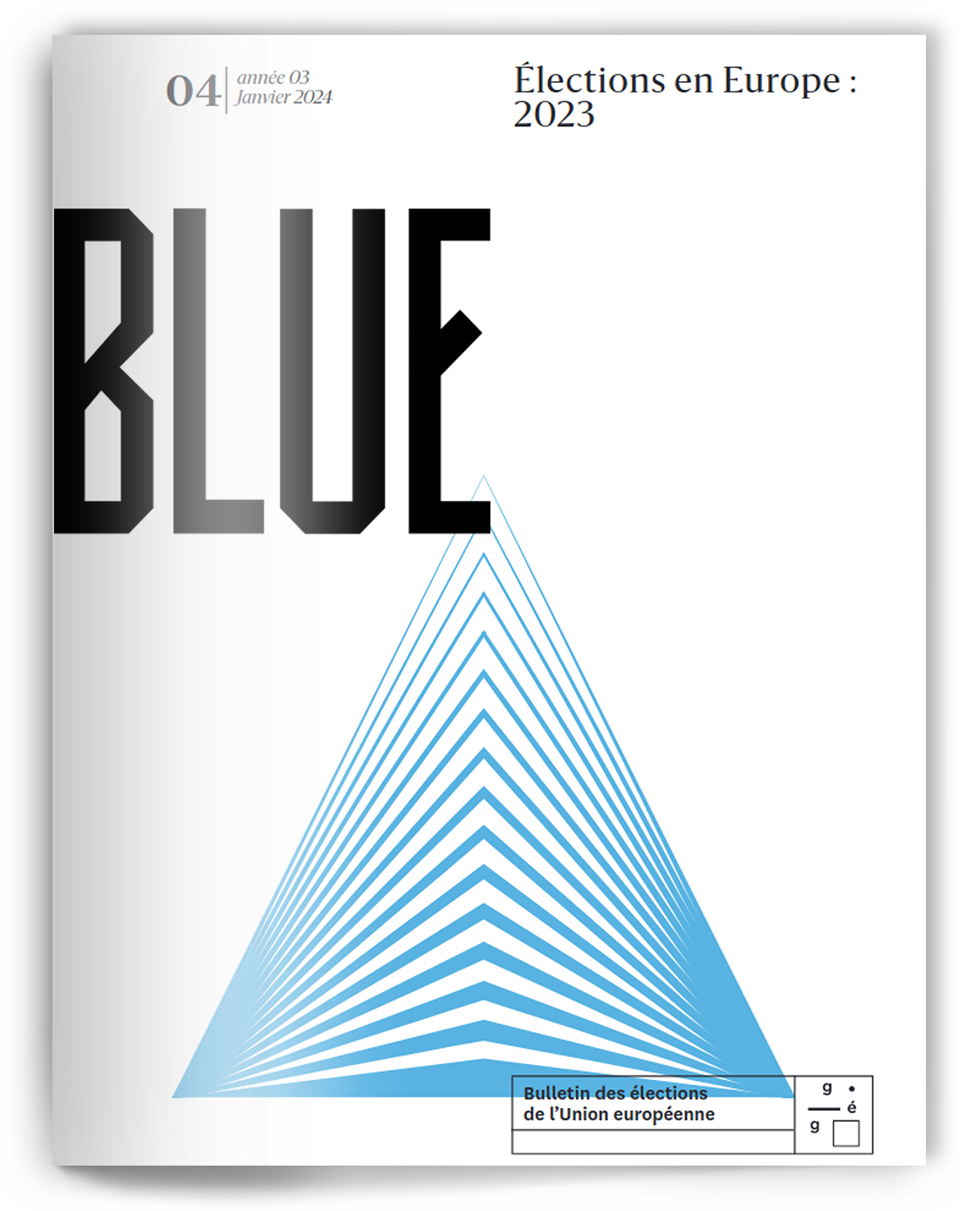
Issue 4, January 2024
Elections in Europe: 2023
Introduction
The political situation in the 48th National Assembly, after the October 2022 elections, repeated the previous parliamentary fragmentation, combined with a high level of political hostility and widespread expectation of new snap elections. Thus, after three unsuccessful attempts by the parties and coalitions represented in parliament to form a government, President Rumen Radev announced new snap elections. The elections for the 49th National Assembly were held on April 2, 2023, and the political battle was between the parties of the reform (We Continue the Change (PP) and Democratic Bulgaria (DB), united in a coalition) and the parties of the status quo (the GERB-SDS coalition, DPS and BSP). At the same time, the war in Ukraine led to a significant realignment of political parties and coalitions. For instance the BSP, which supported anti-corruption protests in 2020 and was part of the anti-GERB coalition in Kiril Petkov’s government, opposed the sending of weapons to Ukraine, and this put it at odds with its until recently governing partners, the PP and DB.
The context
To better understand the situation ahead of the April 2023 snap elections, we need to look not only at the positions of the main political parties, but also at the figure of the president. According to the constitution, the executive powers of the Bulgarian president are very limited. Nevertheless, the president has an important role during periods of political crisis: for example, when the parliament is unable to elect a government, the President has a right to dissolve the parliament, to schedule elections for a new parliament and to appoint a caretaker government. Thanks to this, through the caretaker cabinets which President Radev appointed during the political crisis 2021-2023, he became the most influential political figure and was able to influence considerably both the foreign and the domestic policies of the country. This political activism of the president, which often violated the spirit of the constitution, was a significant concern for the reformist parties. Bringing the President’s prerogatives back to the constitutional frame of the institution became one of their policy objectives. President Radev spoke against sending additional weapons in support of Ukraine, for which he was accused by GERB-SDS and PP-DB that in this way he was violating a decision of the National Assembly, which obliges the government to provide military aid to Kyiv.
At the same time, GERB-SDS was not comfortable with the increasing political influence of the president as well. Additionally, in January 2023, under the Global Magnitsky Act, the US State Department of the Treasury accused of corruption several influential Bulgarian political figures (from GERB and BSP), such as Vladislav Goranov, former Minister of Finance in Borisov’s third government (2017-2021) and Rumen Ovcharov, former Minister of Economy and Energy in the Sergei Stanishev’ cabinet (2005-2009) and а current member of the BSP National Council. This put additional pressure on the GERB-SDS coalition to look for a coalition with its main opponent PP-DB. GERB-SDS also wanted to avoid being portrayed any longer as a toxic party by its opponents and their voters. This was only possible if PP-DB stopped criticising the corruption model built during GERB’s time in government.
The Campaign
Unlike the previous snap elections in the past two years, this time the political confrontation of the two main opponents of GERB-SDS and PP-DB was less polarized during the election campaign. They indicated the importance of forming a government elected by the parliament, which would restore parliamentarism in the country and put the political crisis to an end. At the very beginning of their campaign, GERB-SDS stated that a grand coalition between the two leading formations (GERB-SDS and PP-DB) would be the most stable government (Iliev, 2023). However, the PP-DB coalition indicated that, upon winning the elections, it would have proposed a minority government and categorically rejected the possibility of forming a cabinet with GERB-SDS (Dimitrova, 2023).
The main topics of the political debate were related to the economic situation in the country, inflation, corruption, and reform of the judiciary. The rise in prices has always been a sensitive issue for Bulgarian society and quite naturally became one of the most salient topics. But foreign politics was also addressed during the campaign. For instance, the far-right party Revival deliberately spread misinformation, claiming that Bulgaria could be involved in the war in Ukraine if a euro-Atlantic coalition (PP-DB and GERB-SDS) came to power after the elections (Tzoneva, 2023). This further deepened the polarisation between pro-Russian and pro-European voters in the country.
Electoral Results and Turnout
The results of the April 2023 elections were not a surprise for Bulgarian political observers. Weeks before the voting day, sociological agencies announced in the media their expectations of a low turnout and a minimal electoral distance between the two competing coalitions (GERB-SDS and PP-DB). Interestingly, the sociologists expected that the far-right Revival would compete for third place with the ethnic party DPS. The other interesting expectation was that the electoral decline of BSP would continue. This sociological prognosis was confirmed on election day. In fact, the snap elections produced a fragmented parliament, with six parties or coalitions — GERB-SDS, PP-DB, Revival, DPS, BSP, ITN — represented in the National Assembly. The results of the elections outlined tough negotiations to form a government with two main options: either a grand coalition between the first two coalitions GERB-SDS and PP-DB, or a coalition between GERB, DPS, BSP and ITN.
GERB-SDS
GERB-SDS won the second snap elections in a row and finally emerged from the political isolation the party fell into after the anti-corruption protests in 2020 and that had prevented the party from finding government partners in previous elections. Together with its smaller coalition partner SDS, GERB won 669,924 votes, corresponding to 26.49% of the vote and 69 out of the 240 seats in parliament.
With this victory, GERB demonstrated that no government can be formed without them. The results of the elections showed that GERB is evenly represented in all regions of the country, regardless of the size of the settlement. The structure of GERB’s vote in terms of the size of the settlement is as follows: Sofia — 15.5%, regional cities — 47.1%, small towns — 24.6%, villages — 15.6% (Trend, 2023). These data show that GERB is the only real People’s party in the country. Long years in government at both the national and local levels created a strong party on the ground which on the one hand sustained GERB’s popularity through clientelism, and on the other contributed to the institutionalisation of the party itself.
PP-DB
The PP-DB coalition was created to win the most votes in the elections, in order to be the first to receive from the president the mandate to form a government, as stipulated by the Bulgarian constitution. But the expectation that forming a coalition would help to achieve better results was not met. There are several reasons for this. One of them is the bland election campaign that the coalition conducted (Popov, 2023), another one might be the disappointment of PP voters, 25% of whom this time preferred to vote for other political parties (Bulgarian National Television, 2023). In the current election, the new coalition received 621,069 votes or 24.45% of the vote, which is 70,000 fewer votes than PP and DB had received separately in the previous elections in October 2022. Thus, the PP-DB has the second largest parliamentary group with 64 deputies.
The PP-DB coalition won convincingly in the Sofia constituencies with 40% of the vote. This shows that the new coalition is the favourite to win the local elections in Sofia, which will be held this autumn, and to break GERB’s 18-year rule in the capital. It was mostly younger citizens who voted for PP-DB, as one third of all voters between the ages of 18 and 29 gave their vote to the coalition (Trend, 2023).
Revival
Revival (Vazrazhdane) is the only party that significantly increased its electoral result, by more than 100,000 votes. The party received the support of 358,174 voters, or 14.16% of the vote, putting it in third place. Thus, the party has 37 MPs. This far-right party articulated the anti-European sentiments by initiating a campaign for a referendum against the adoption of the euro in Bulgaria. Under the slogan “Let’s save Bulgarian lev” (Bulgarian currency), the party succeeded to collect more than 400,000 signatures from citizens (Vassev, 2023) in support of the idea of holding a referendum about postponing Bulgaria’s accession to the Eurozone (until 2043). Thus, during its electoral campaign and the campaign for the referendum, Revival succeeded to attract not only radical nationalists and Russophiles, but also people disillusioned by the nearly two-year-long political crisis (Bulgarian National Television, 2023), and the growing economic uncertainty, who fear that an eventual accession of the country to the Eurozone will lead to higher social insecurity.
The electoral support for Revival comes largely from the people within the 40-49 age range (26.1%) (Trend, 2023). Rather surprisingly, the majority of party voters have higher education – 53.5%, which is a significant difference with other far-right formations of the past such as Ataka (Karasimeonov, 2010: 209). Growing support for Revival is a fundamental challenge to liberal democracy in the country, especially if the political crisis deepens in the future.
DPS
DPS is the most predictable party in the country in terms of electoral results. Ethnic Turks inhabiting the northeastern and southeastern regions of the country traditionally vote for the party. DPS took fourth place, being supported by 347,700 voters (13.75% of the vote) and elected 36 MPs. DPS got the best result in the vote abroad – 36.58% or 64,182 votes, which came mostly from Türkiye.
According to the exit poll data of the Trend Research Centre, 77% of DPS voters live in villages. 29% of them are unemployed — and this is the highest share compared to the other parties (Trend, 2023). These elections confirmed the trend that Roma citizens mainly vote for DPS: 37.7% of Roma voters supported the DPS lists (ibidem). This is, however, largely related to vote buying and controlled voting (Voeva, 2023)
BSP
These elections confirmed the trend of declining support for BSP — one of the mainstream parties in the country. The Socialist Party was supported by 225,914 voters or 8.93% of the vote. Thus, the party is the fifth largest parliamentary group with 23 representatives in the parliament. The main problems in the BSP are the political leadership, which is extremely unpopular among left-wing voters and has led to several splits in recent years (Balev, 2021). The main competitor on the left in these elections was “The Left”, which took only 2.23%. BSP lost a significant part of its pro-Russian and nationalist voters, who shifted their vote to Revival (Trend, 2023). This further eroded electoral support for the BSP. A significant decline of the BSP is observed even in the smaller towns and villages, where it was traditionally the first political force in the recent past (Karasimeonov, 2010: 227). Nearly 30% of BSP voters are over 70 years old (Trend 2023).
ITN
Contrary to the pre-electoral expectations (Narod, 2023), ITN passed the 4% threshold and returned to parliament. The entry of ITN into the parliament was due to the low voter turnout, which made the 4% threshold lower in terms of absolute number of votes. The party received 103,971 votes, or 4.11% of the total. ITN is the smallest parliamentary group in the National Assembly, with 11 representatives. Compared to the last snap election, the party has increased its result by around 7,000 votes. Support for ITN comes mainly from voters who are critical of the traditional political establishment, living in smaller cities and some regions in Northern Bulgaria, such as Pleven.
Post-election period
The political situation after the elections was dominated by the scandal that started between the Prosecutor General and one of his deputies, which revealed severe political dependencies and abuses in the prosecutor’s office (Dachkova, 2023). This further increased public pressure for reforms in the justice system — a major cause of the 2020 protests and a top priority in the PP-DB programme.
After the seating of the new National Assembly, the two main coalitions GERB-SDS and PP-DB began negotiations to reach an agreement on a common legislative framework, with the aim of finding an acceptable governing formula (Mediapool, 2023). They agreed on a rotating speaker of the parliament, with a GERB-SDS representative first elected to the post, who would be replaced by a PP-DB representative after three months (ibidem). GERB-SDS insisted on a grand coalition based on the principle of parity, headed by a prime minister nominated by GERB (ibidem). The PP-DB rejected this proposal, stating that they would fulfil their election promises and would not support a government with a GERB-SDS mandate or with the participation of its ministers (ibidem). That is why GERB-SDS started negotiations with BSP, DPS, and ITN (Darik News. 2023), leaving the door open for continuing talks with PP-DB. GERB-SDS nominated the Bulgarian Commissioner in the European Commission, Maria Gabriel (GERB), as a candidate for Prime Minister. She declared that one of the first tasks of the government would be a request to the Supreme Judicial Council to remove the chief prosecutor, Ivan Geshev (Minkov, 2023). Gabriel’s statement was a significant change in the positions of GERB, which until now had been the main defender of the Prosecutor General and opposed any attempts to limit his powers. Immediately after Gabriel’s request, four members of the prosecutor’s collegium of the Supreme Judicial Council fileded a request to dismiss Ivan Geshev as chief prosecutor.
Government formation
The scandal in the prosecutor’s office had a major impact on the government formation process. The chief prosecutor Ivan Geshev, who until then had been passive in the corruption cases involving former prime minister and GERB leader Boyko Borisov (Nehring, 2020), requested the National Assembly to lift Borisov’s parliamentary immunity, so that he could be charged with money laundering in the so-called “Barcelonagate” 1 . Pressure from the chief prosecutor catalysed negotiations between GERB-SDS and PP-DB, which this time produced a result. A rotating government was agreed upon for a period of one and a half years (Svobodna Evropa, 2023). During the first 9 months, the Prime Minister will be Prof. Nikolay Denkov, chairman of the PP-DB parliamentary group and a member of the PP leadership, who will be replaced by Maria Gabriel (GERB) for the next 9 months. Initially, Gabriel will be Deputy Prime Minister and Minister of Foreign Affairs. The predominant part of the government consists of non-party experts, but there are also strong political figures such as the co-chairman of the PP Assen Vassilev, who will be the Minister of Finance. GERB-SDS and PP-DB did not sign a coalition agreement, as the latter was reluctant to enter an official coalition with its main political opponent (24 chassa, 2023) The PP-DB even publicly insisted that the government should not be called a coalition, stating that this was a bigcompromise for them, but they accepted this formula in the name of reforms (Dnevnik, 2023). The main priorities of the new government will be a change in the constitution with the aim of reforming the prosecutor’s office and the judiciary, Bulgaria’s membership in Schengen and the Eurozone, and support for Ukraine by sending arms and ammunition.
Conclusion
The form of government, with rotating prime ministers, is very unusual for the Bulgarian political practice, and it is hard to predict how long this government will survive. The founding ambition of the government to make possible the entrance of Bulgaria in the Schengen zone and to accelerate the accession of the country to the Eurozone could either stabilise or destroy the government formation. Undoubtedly, one of the important tests for this government will be the upcoming local elections in October 2023. The outcome of these elections could have a significant impact on the fate of this uneasy compromise. The other election with a potential to change the government formation is the upcoming European Parliament election in May 2024. Thus, there are still several obstacles in front of the government, but as a popular Bulgarian saying goes, temporary things are very stable.
The data
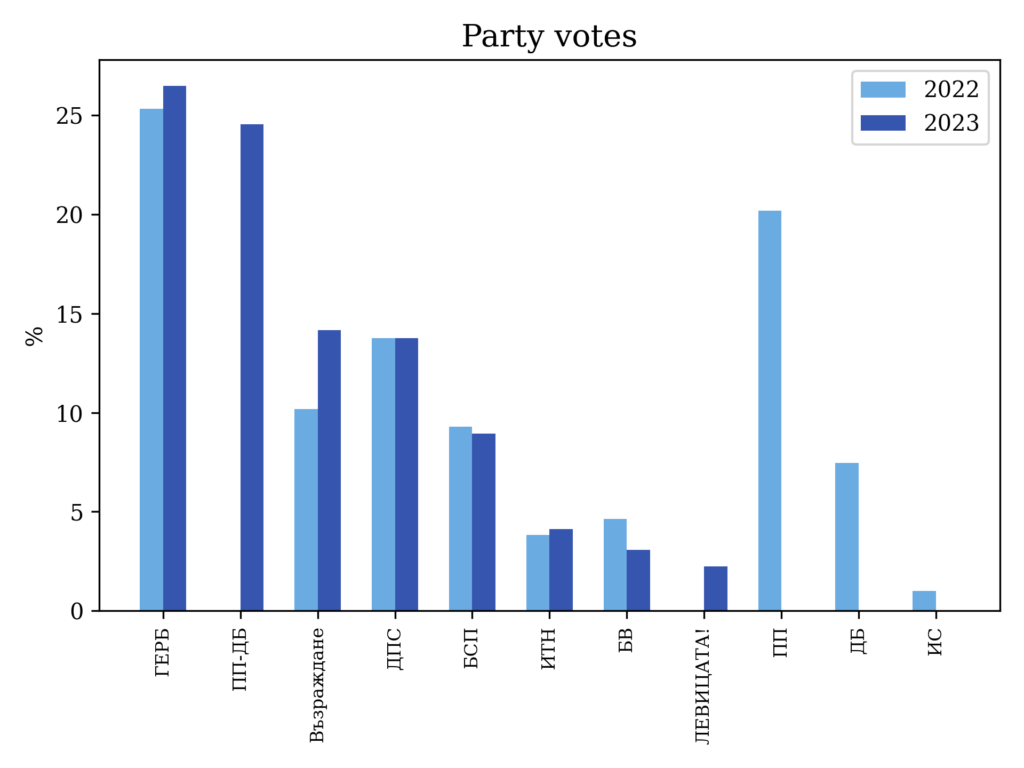
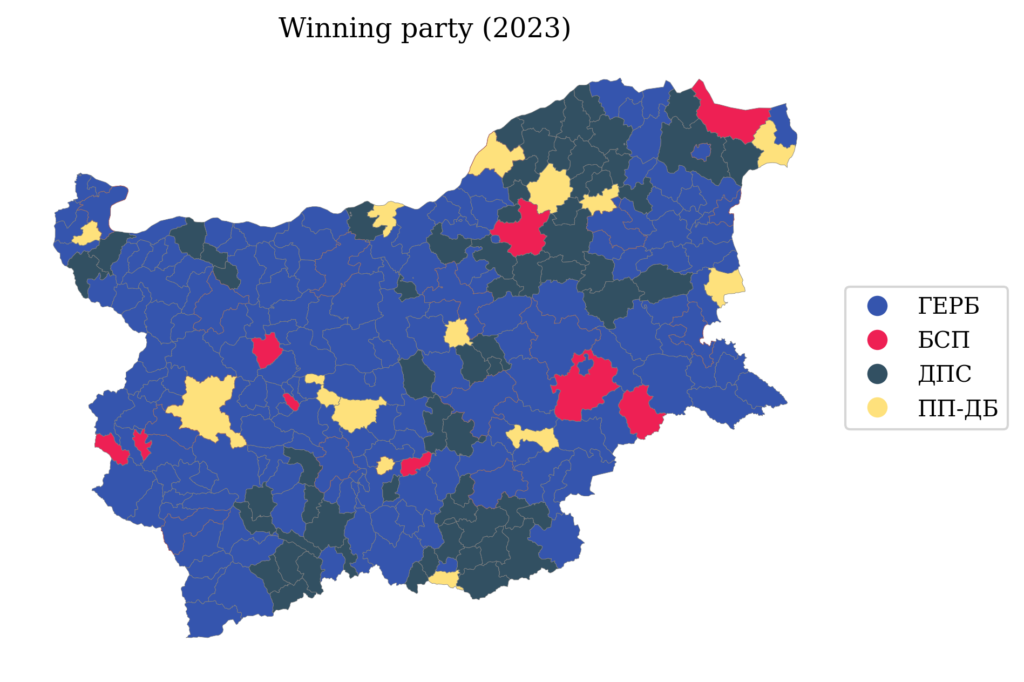
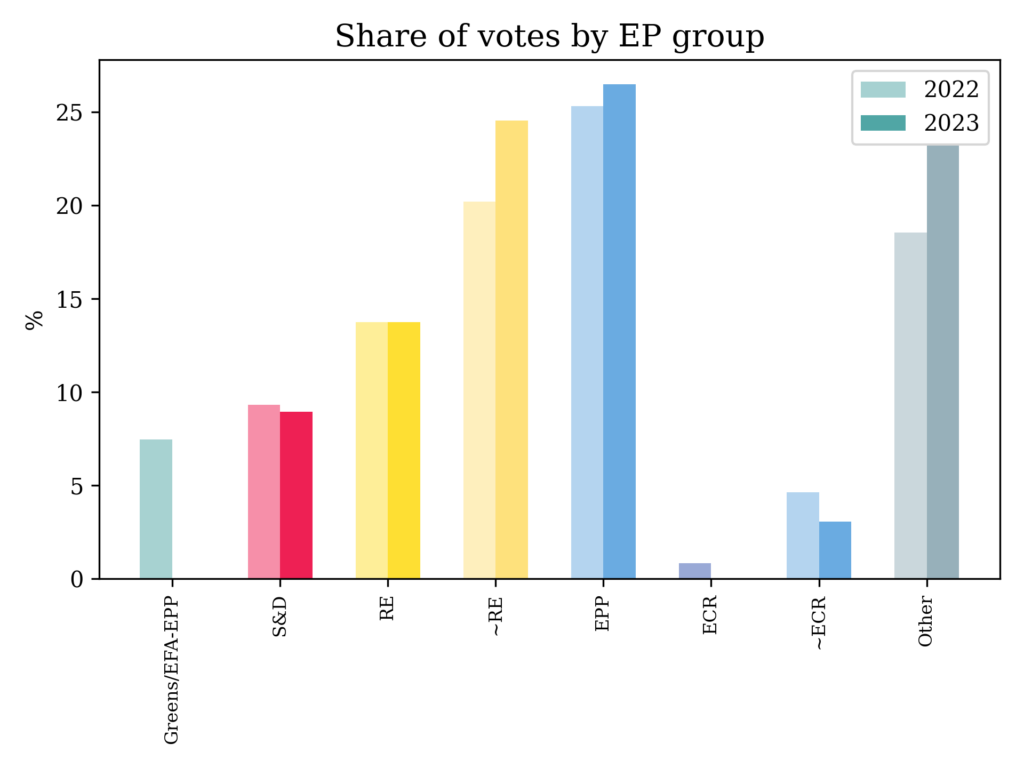
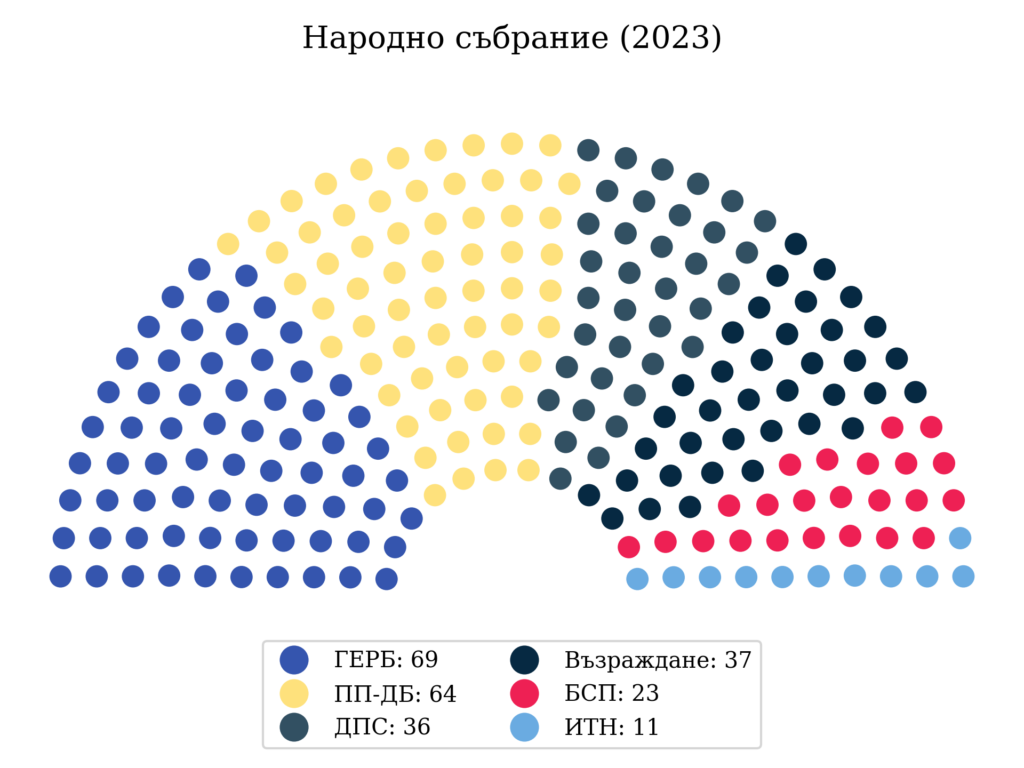
References
24 chassa (2023, 23 May). Kiril Petkov: Rotatziata na premieri ne e koalitzia s GERB. Online.
Balev, B. (2021, 31 December). Osnovniat problem na BSP e liderski. BNR. Online.
Bulgarian National Television (2023, 3 April). Otkade “Vazrazhdane” specheli novi glasove, kade PP-DB zagubi I kak ITN stapi na barierata? Online.
Central Electoral Commission of the republic of Bulgaria (2023). Results of the parliamentary Elections on April 2, 2023. Online.
Dachkova, D. (2023, 16 May). Zamestnik glavniat prokuror dade na prokuror glavnia prokuror. SEGA. Online.
Darik News (2023, 4 May). GERB-SDS obsadiha sektornite politiki s DPS, BPS, I ITN, ima li consensus (Obzor). Online.
Dimitrova, M. (2023, 17 May). Petkov: ili cabinet s mandat na PP-DB ili otivame na izbori. BG On Air. Online.
El Periodicо (2020, 20 February). Una investigación por blanqueo de dinero en Barcelona apunta al primer ministro de Bulgaria. Online.
Fileva. M (2023, 23 January). ITN vnese podpiska za referendum za preminavane kam prtezidentska republika. BNR. Online.
Hristova, A. (2023). Kabinetat “Denkov-Gabrieal” poe vlastta v usloviata na voyna s prezidenta I naprezhenie v parlamenta. Dnevnik. Online.
Iliev, L. (2023, 24 June). Borisov nastoiava GERG I PP.DB da vliazat oficialno v koalitsia. SEGA. Online.
Karasimeonov, G. (2010). Party system in Bulgaria. Gorex Press.
Mediapool (2023, 18 April). Za kakva zakonodatelna programa se razbraha GERB I PP-DB (spissak). Mediapool. Online.
Minkov. N. (2023, 11 May). Maria Gabriel poiska ostavkata na Geshev – kak reagiraha politicheskite sili? Bulgarian National Television. Online.
Narod (2023, 31 March). Fotofinish: Posledni prognozi – koi pecheli izboritye na 2 april? (grafiki). Narod. Online.
Nehring, C. (2020, 16 July). Deystviyata na Geshev sa skandalni. DW. Online.
Popov, A. (2023, 31 March). Viala kampania I oskadno politichesko menu. Dnes. Online.
Svobodba Evropa (2023, 22 May). GERB I PP-DB se razbraha za pravitelstvo. Denkov I Gabriel shte se reduvat kato premieri. Svobodna Evropa. Online.
Trend (2023, April). Voter profile (exit poll from April 2023 parliamentary elections). Online.
Tzoneva, Y. (2023, 20 February). “Vazrazhdane”: Raboti se za pravitelstvo, koeto da ni vkara vav voinata. Dnes. Online.
Vassev. K. (2023, 29 March). Some 501,000 Signatures Collected for Referendum against Euro Changeover. BTA. Online.
Voeva, D. (2023). The Democratic Mask of Political Engineering: Amendments to the Electoral Rules in Bulgaria (2009-2021). PhD Thesis, written at the department of Political Sience of Sofia University “St. Klimen Ohridski”.
Notes
- The term refers to a political scandal concerning Borisov. In early 2020, the Catalan magazine El Periodico published an article claiming that the Spanish police had launched a money-laundering investigation related to the purchase of a house in Barcelona, where a woman close to Boyko Borisov lives (El Periodico, 2020).
citer l'article
Dragomir Stoyanov, Milen Lyubenov, Parliamentary election in Bulgaria, 2 April 2023, Jun 2024,
à lire dans cette issue
voir toute la revue





